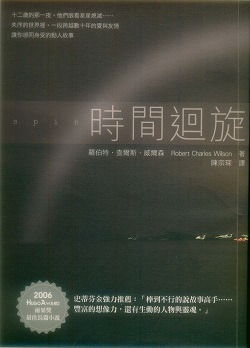Chapter 1 Chinese version author's preface
Preface to the Author of the Chinese Version of "Whirlwind of Time"
"Time Turns" is my twelfth novel.Since I entered the forest of professional writers in 1986, my works have always been well received, but compared with previous works, "Time Turns" has more readers and has been translated into various languages more widely.The book has also won some international awards, and to my surprise, besides the Hugo Award, it also includes Israel's Giffen Award ① and Germany's Kodd.Laszweiz Award②.
I don't have a simple explanation for the success of this book.Basically, the story of "Winning in Time" describes a person, a family, or even an entire generation being involved in a series of incomprehensible events.I think contemporary readers might resonate with this theme.After all, the world we live in has survived the threat of a nuclear war for more than half a century, and now it has to face newer and more potential crises, such as global warming and the scarcity of natural resources.Under the onslaught of human technology, the fragility of this planet has begun to be exposed, and the end of the world seems to be a footnote in the daily headlines.At least in the United States, people often say that after 9/11, everything changed.
Could it be this kind of realization, this kind of delusion of being persecuted, that made "Time Cycling" so popular?
Maybe, maybe not. "Wind in Time" is not a novel that deals with current affairs, at least I didn't intend to write it in this way.It employs many rhetoric and elements specific to the sci-fi genre (I fell in love with the genre at a young age), but one of the goals I hoped to achieve in this novel was to find The human care under the appearance, and simply and directly present these cares to the readers.
Life is short, and the universe we live in is impossibly old; radical change is inevitable.In my opinion, these are the core concepts of science fiction.However, they are also profound truths of human nature, deeply affecting every individual and society.
The events described in "Wind in Time" are not so much an apocalyptic apocalypse as a means by which the writers make human beings face up to their place in a universe with a long history and ever-evolving growth.Each character's response to the crisis, whether religious, scientific, or intimate, is woven into the story.The central idea of the whole novel, which is the so-called time gyration in the mouth of the characters, is really not a credible speculation about the future, just as it is impossible for us to believe that the time opportunity described by HG Wells was created by Victorian craftsmanship. Products that can be built.But The Time Machine takes readers into a form of the future that almost entirely reflects the scientific knowledge (and spiritual and religious crises) of the time. "Wind in Time" reminds us of the fragility of the earth, makes us realize that the present is only a moment, and makes us realize that whether it is an ancient universe or a short and surprising life, change is always impermanent.I hope that with these inspirations, readers can have the same feeling as reading "The Time Machine".
Robert.Charles.Robert Charles Wilson
Translated by: Lin Hanchang
①Translation note: The Geffen Award, commemorated by the Israel Science Fiction and Fantasy Association, editor and translator Amos.The awards presented by Amos Geffen are divided into four categories: Best Translated Science Fiction Book, Best Translated Fantasy Book, Best Original Science/Fantasy Short Story in Hebrew, and Best Original Science/Fantasy Novel in Hebrew Item, "Time Cycling" is the winner of the best translated science fiction book in 2006.
②Translation note: The Kurd Lasswitz Prize is Germany's main science fiction award, in which foreign science fiction projects are awarded, and "Wind in Time" was also the winner in 2006.

